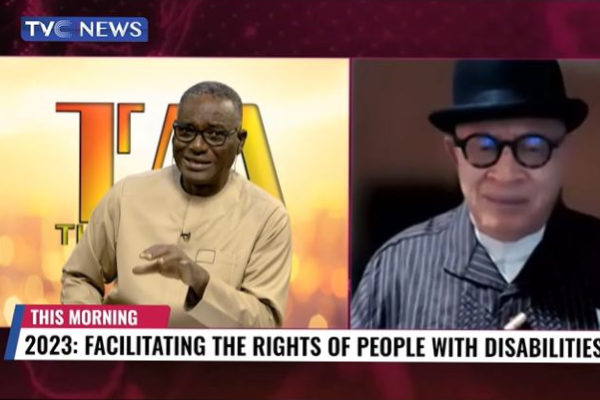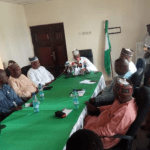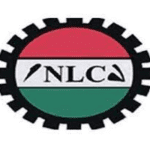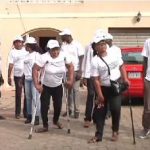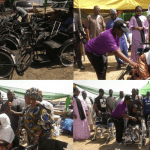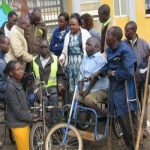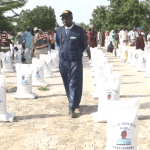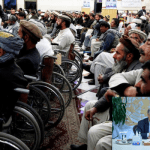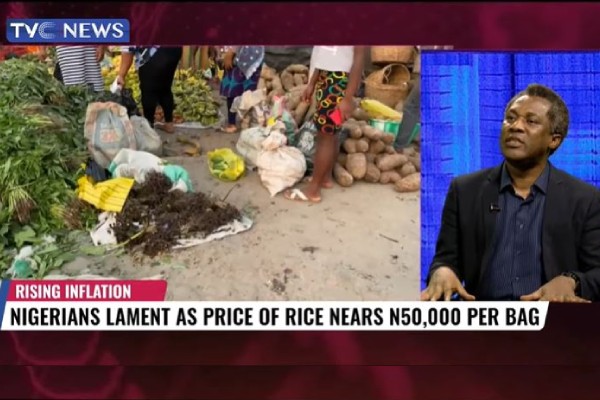Policy Development and Advocacy Expert, Founder, Albino Foundation, Jake Eppele says the rights of people with disabilities to vote has gotten extremely better than what it used to be.
Speaking on TVC’s This Morning show with Yori Folarin, the advocacy expert noted that previous strategy used by the foundation was to make all the noise in terms of being pragmatic and boisterous.
[wonderplugin_video iframe=”https://youtu.be/xa7mBcFYTRw” lightbox=0 lightboxsize=1 lightboxwidth=960 lightboxheight=540 autoopen=0 autoopendelay=0 autoclose=0 lightboxtitle=”” lightboxgroup=”” lightboxshownavigation=0 showimage=”” lightboxoptions=”” videowidth=600 videoheight=400 keepaspectratio=1 autoplay=0 loop=0 videocss=”position:relative;display:block;background-color:#000;overflow:hidden;max-width:100%;margin:0 auto;” playbutton=”https://www.tvcnews.tv/wp-content/plugins/wonderplugin-video-embed/engine/playvideo-64-64-0.png”]
He noted that all of these have now been streamlined into a policy and framework which now makes it mandetory for INEC to carry out inclusivity such that persons with disability now has an electoral act which stipulates section 52 subsection 1& 2 that makes it mandatory for INEC to drive an inclusive election with necessary electoral provisions and resources that makes it accessible for persons with disabilities of all forms to partake in electoral processes.
Mr Epelle stated that it was also important to use the right terminologies for persons with disabilities as it is important to put the person before the challenges or issues to ensure that they don’t feel stigmatised.
According to him, issues will always go away but the person remains, it is therefore good to celebrate the person and not what happened to the person.
He also stated that institutions such as INEC have put in place procedures to ensure inclusivity, which is considerably superior than what was available in previous years.
Mr Epelle said with elections coming, everything should not start and end at the national, we need to also begin to look at the sub national as well as local governments and even the hamlets.
“Our job is broad-based, we are trying to reach every Hamlet, every locality, every sub-national, national and regional as well.”
The advocacy expert stated that the Albino Foundation is a foundation for ‘All Persons With Disability.’
He stated that in the next few weeks, there will be a name change for the organisation.
Speaking further, Programmes Manager, The Albino Foundation, Ndifreke Ferdinand stated that the concern of the foundation is on persons with disabilities, not just Albinism.
She added that the programs of the foundation vary from advocacy for persons with disability to Community Development which also deals on education and health.
According to Ms Ferdinand, a lot of research is also done by the foundation.
“Currently there is an ongoing campaign ‘Able To Vote’ a zonal voter education campaign programme for persons with disabilities to enhance and improve their active participation in the political processes.
“We want to see more persons included in the electoral process”.
Mr Epelle explained that Albinism is a genetic condition that presented itself in issues around lack of melanin.
According to him, the issue is not the non-availability but the insufficient or inadequate amount of melanin resulting in the pale skin that one sees. The eye (Retina), hairs are also affected as a result of the insufficient supply of melanin.
The challenges around a person with Albinism automatically moves them into the category of persons with disability.
Highlighting some of the challenges, Mr Epelle said visual impairment is the number one physical disability experienced with Albinism.
Discrimination is an aspect that the United Nations Convention of Rights of persons with disability has captured as when you have adverse discrimination that does not make room for reasonable accommodation, you can be termed a person with disability.
Consistent staying outdoor in the Sun can also lead to skin cancer which is another challenge.
According to Ms Ferdinand, one of the most significant challenges that people with disabilities encounter is societal stigma and discrimination.
Policy Development and Advocacy Expert, Founder, Albino Foundation, Jake Eppele says the rights of people with disabilities to vote has gotten extremely better than what it used to be.
Speaking on TVC’s This Morning show with Yori Folarin, the advocacy expert noted that previous strategy used by the foundation was to make all the noise in terms of being pragmatic and boisterous.
[wonderplugin_video iframe=”https://youtu.be/xa7mBcFYTRw” lightbox=0 lightboxsize=1 lightboxwidth=960 lightboxheight=540 autoopen=0 autoopendelay=0 autoclose=0 lightboxtitle=”” lightboxgroup=”” lightboxshownavigation=0 showimage=”” lightboxoptions=”” videowidth=600 videoheight=400 keepaspectratio=1 autoplay=0 loop=0 videocss=”position:relative;display:block;background-color:#000;overflow:hidden;max-width:100%;margin:0 auto;” playbutton=”https://www.tvcnews.tv/wp-content/plugins/wonderplugin-video-embed/engine/playvideo-64-64-0.png”]
He noted that all of these have now been streamlined into a policy and framework which now makes it mandetory for INEC to carry out inclusivity such that persons with disability now has an electoral act which stipulates section 52 subsection 1& 2 that makes it mandatory for INEC to drive an inclusive election with necessary electoral provisions and resources that makes it accessible for persons with disabilities of all forms to partake in electoral processes.
Mr Epelle stated that it was also important to use the right terminologies for persons with disabilities as it is important to put the person before the challenges or issues to ensure that they don’t feel stigmatised.
According to him, issues will always go away but the person remains, it is therefore good to celebrate the person and not what happened to the person.
He also stated that institutions such as INEC have put in place procedures to ensure inclusivity, which is considerably superior than what was available in previous years.
Mr Epelle said with elections coming, everything should not start and end at the national, we need to also begin to look at the sub national as well as local governments and even the hamlets.
“Our job is broad-based, we are trying to reach every Hamlet, every locality, every sub-national, national and regional as well.”
The advocacy expert stated that the Albino Foundation is a foundation for ‘All Persons With Disability.’
He stated that in the next few weeks, there will be a name change for the organisation.
Speaking further, Programmes Manager, The Albino Foundation, Ndifreke Ferdinand stated that the concern of the foundation is on persons with disabilities, not just Albinism.
She added that the programs of the foundation vary from advocacy for persons with disability to Community Development which also deals on education and health.
According to Ms Ferdinand, a lot of research is also done by the foundation.
“Currently there is an ongoing campaign ‘Able To Vote’ a zonal voter education campaign programme for persons with disabilities to enhance and improve their active participation in the political processes.
“We want to see more persons included in the electoral process”.
Mr Epelle explained that Albinism is a genetic condition that presented itself in issues around lack of melanin.
According to him, the issue is not the non-availability but the insufficient or inadequate amount of melanin resulting in the pale skin that one sees. The eye (Retina), hairs are also affected as a result of the insufficient supply of melanin.
The challenges around a person with Albinism automatically moves them into the category of persons with disability.
Highlighting some of the challenges, Mr Epelle said visual impairment is the number one physical disability experienced with Albinism.
Discrimination is an aspect that the United Nations Convention of Rights of persons with disability has captured as when you have adverse discrimination that does not make room for reasonable accommodation, you can be termed a person with disability.
Consistent staying outdoor in the Sun can also lead to skin cancer which is another challenge.
According to Ms Ferdinand, one of the most significant challenges that people with disabilities encounter is societal stigma and discrimination.
Policy Development and Advocacy Expert, Founder, Albino Foundation, Jake Eppele says the rights of people with disabilities to vote has gotten extremely better than what it used to be.
Speaking on TVC’s This Morning show with Yori Folarin, the advocacy expert noted that previous strategy used by the foundation was to make all the noise in terms of being pragmatic and boisterous.
[wonderplugin_video iframe=”https://youtu.be/xa7mBcFYTRw” lightbox=0 lightboxsize=1 lightboxwidth=960 lightboxheight=540 autoopen=0 autoopendelay=0 autoclose=0 lightboxtitle=”” lightboxgroup=”” lightboxshownavigation=0 showimage=”” lightboxoptions=”” videowidth=600 videoheight=400 keepaspectratio=1 autoplay=0 loop=0 videocss=”position:relative;display:block;background-color:#000;overflow:hidden;max-width:100%;margin:0 auto;” playbutton=”https://www.tvcnews.tv/wp-content/plugins/wonderplugin-video-embed/engine/playvideo-64-64-0.png”]
He noted that all of these have now been streamlined into a policy and framework which now makes it mandetory for INEC to carry out inclusivity such that persons with disability now has an electoral act which stipulates section 52 subsection 1& 2 that makes it mandatory for INEC to drive an inclusive election with necessary electoral provisions and resources that makes it accessible for persons with disabilities of all forms to partake in electoral processes.
Mr Epelle stated that it was also important to use the right terminologies for persons with disabilities as it is important to put the person before the challenges or issues to ensure that they don’t feel stigmatised.
According to him, issues will always go away but the person remains, it is therefore good to celebrate the person and not what happened to the person.
He also stated that institutions such as INEC have put in place procedures to ensure inclusivity, which is considerably superior than what was available in previous years.
Mr Epelle said with elections coming, everything should not start and end at the national, we need to also begin to look at the sub national as well as local governments and even the hamlets.
“Our job is broad-based, we are trying to reach every Hamlet, every locality, every sub-national, national and regional as well.”
The advocacy expert stated that the Albino Foundation is a foundation for ‘All Persons With Disability.’
He stated that in the next few weeks, there will be a name change for the organisation.
Speaking further, Programmes Manager, The Albino Foundation, Ndifreke Ferdinand stated that the concern of the foundation is on persons with disabilities, not just Albinism.
She added that the programs of the foundation vary from advocacy for persons with disability to Community Development which also deals on education and health.
According to Ms Ferdinand, a lot of research is also done by the foundation.
“Currently there is an ongoing campaign ‘Able To Vote’ a zonal voter education campaign programme for persons with disabilities to enhance and improve their active participation in the political processes.
“We want to see more persons included in the electoral process”.
Mr Epelle explained that Albinism is a genetic condition that presented itself in issues around lack of melanin.
According to him, the issue is not the non-availability but the insufficient or inadequate amount of melanin resulting in the pale skin that one sees. The eye (Retina), hairs are also affected as a result of the insufficient supply of melanin.
The challenges around a person with Albinism automatically moves them into the category of persons with disability.
Highlighting some of the challenges, Mr Epelle said visual impairment is the number one physical disability experienced with Albinism.
Discrimination is an aspect that the United Nations Convention of Rights of persons with disability has captured as when you have adverse discrimination that does not make room for reasonable accommodation, you can be termed a person with disability.
Consistent staying outdoor in the Sun can also lead to skin cancer which is another challenge.
According to Ms Ferdinand, one of the most significant challenges that people with disabilities encounter is societal stigma and discrimination.
Policy Development and Advocacy Expert, Founder, Albino Foundation, Jake Eppele says the rights of people with disabilities to vote has gotten extremely better than what it used to be.
Speaking on TVC’s This Morning show with Yori Folarin, the advocacy expert noted that previous strategy used by the foundation was to make all the noise in terms of being pragmatic and boisterous.
[wonderplugin_video iframe=”https://youtu.be/xa7mBcFYTRw” lightbox=0 lightboxsize=1 lightboxwidth=960 lightboxheight=540 autoopen=0 autoopendelay=0 autoclose=0 lightboxtitle=”” lightboxgroup=”” lightboxshownavigation=0 showimage=”” lightboxoptions=”” videowidth=600 videoheight=400 keepaspectratio=1 autoplay=0 loop=0 videocss=”position:relative;display:block;background-color:#000;overflow:hidden;max-width:100%;margin:0 auto;” playbutton=”https://www.tvcnews.tv/wp-content/plugins/wonderplugin-video-embed/engine/playvideo-64-64-0.png”]
He noted that all of these have now been streamlined into a policy and framework which now makes it mandetory for INEC to carry out inclusivity such that persons with disability now has an electoral act which stipulates section 52 subsection 1& 2 that makes it mandatory for INEC to drive an inclusive election with necessary electoral provisions and resources that makes it accessible for persons with disabilities of all forms to partake in electoral processes.
Mr Epelle stated that it was also important to use the right terminologies for persons with disabilities as it is important to put the person before the challenges or issues to ensure that they don’t feel stigmatised.
According to him, issues will always go away but the person remains, it is therefore good to celebrate the person and not what happened to the person.
He also stated that institutions such as INEC have put in place procedures to ensure inclusivity, which is considerably superior than what was available in previous years.
Mr Epelle said with elections coming, everything should not start and end at the national, we need to also begin to look at the sub national as well as local governments and even the hamlets.
“Our job is broad-based, we are trying to reach every Hamlet, every locality, every sub-national, national and regional as well.”
The advocacy expert stated that the Albino Foundation is a foundation for ‘All Persons With Disability.’
He stated that in the next few weeks, there will be a name change for the organisation.
Speaking further, Programmes Manager, The Albino Foundation, Ndifreke Ferdinand stated that the concern of the foundation is on persons with disabilities, not just Albinism.
She added that the programs of the foundation vary from advocacy for persons with disability to Community Development which also deals on education and health.
According to Ms Ferdinand, a lot of research is also done by the foundation.
“Currently there is an ongoing campaign ‘Able To Vote’ a zonal voter education campaign programme for persons with disabilities to enhance and improve their active participation in the political processes.
“We want to see more persons included in the electoral process”.
Mr Epelle explained that Albinism is a genetic condition that presented itself in issues around lack of melanin.
According to him, the issue is not the non-availability but the insufficient or inadequate amount of melanin resulting in the pale skin that one sees. The eye (Retina), hairs are also affected as a result of the insufficient supply of melanin.
The challenges around a person with Albinism automatically moves them into the category of persons with disability.
Highlighting some of the challenges, Mr Epelle said visual impairment is the number one physical disability experienced with Albinism.
Discrimination is an aspect that the United Nations Convention of Rights of persons with disability has captured as when you have adverse discrimination that does not make room for reasonable accommodation, you can be termed a person with disability.
Consistent staying outdoor in the Sun can also lead to skin cancer which is another challenge.
According to Ms Ferdinand, one of the most significant challenges that people with disabilities encounter is societal stigma and discrimination.
Policy Development and Advocacy Expert, Founder, Albino Foundation, Jake Eppele says the rights of people with disabilities to vote has gotten extremely better than what it used to be.
Speaking on TVC’s This Morning show with Yori Folarin, the advocacy expert noted that previous strategy used by the foundation was to make all the noise in terms of being pragmatic and boisterous.
[wonderplugin_video iframe=”https://youtu.be/xa7mBcFYTRw” lightbox=0 lightboxsize=1 lightboxwidth=960 lightboxheight=540 autoopen=0 autoopendelay=0 autoclose=0 lightboxtitle=”” lightboxgroup=”” lightboxshownavigation=0 showimage=”” lightboxoptions=”” videowidth=600 videoheight=400 keepaspectratio=1 autoplay=0 loop=0 videocss=”position:relative;display:block;background-color:#000;overflow:hidden;max-width:100%;margin:0 auto;” playbutton=”https://www.tvcnews.tv/wp-content/plugins/wonderplugin-video-embed/engine/playvideo-64-64-0.png”]
He noted that all of these have now been streamlined into a policy and framework which now makes it mandetory for INEC to carry out inclusivity such that persons with disability now has an electoral act which stipulates section 52 subsection 1& 2 that makes it mandatory for INEC to drive an inclusive election with necessary electoral provisions and resources that makes it accessible for persons with disabilities of all forms to partake in electoral processes.
Mr Epelle stated that it was also important to use the right terminologies for persons with disabilities as it is important to put the person before the challenges or issues to ensure that they don’t feel stigmatised.
According to him, issues will always go away but the person remains, it is therefore good to celebrate the person and not what happened to the person.
He also stated that institutions such as INEC have put in place procedures to ensure inclusivity, which is considerably superior than what was available in previous years.
Mr Epelle said with elections coming, everything should not start and end at the national, we need to also begin to look at the sub national as well as local governments and even the hamlets.
“Our job is broad-based, we are trying to reach every Hamlet, every locality, every sub-national, national and regional as well.”
The advocacy expert stated that the Albino Foundation is a foundation for ‘All Persons With Disability.’
He stated that in the next few weeks, there will be a name change for the organisation.
Speaking further, Programmes Manager, The Albino Foundation, Ndifreke Ferdinand stated that the concern of the foundation is on persons with disabilities, not just Albinism.
She added that the programs of the foundation vary from advocacy for persons with disability to Community Development which also deals on education and health.
According to Ms Ferdinand, a lot of research is also done by the foundation.
“Currently there is an ongoing campaign ‘Able To Vote’ a zonal voter education campaign programme for persons with disabilities to enhance and improve their active participation in the political processes.
“We want to see more persons included in the electoral process”.
Mr Epelle explained that Albinism is a genetic condition that presented itself in issues around lack of melanin.
According to him, the issue is not the non-availability but the insufficient or inadequate amount of melanin resulting in the pale skin that one sees. The eye (Retina), hairs are also affected as a result of the insufficient supply of melanin.
The challenges around a person with Albinism automatically moves them into the category of persons with disability.
Highlighting some of the challenges, Mr Epelle said visual impairment is the number one physical disability experienced with Albinism.
Discrimination is an aspect that the United Nations Convention of Rights of persons with disability has captured as when you have adverse discrimination that does not make room for reasonable accommodation, you can be termed a person with disability.
Consistent staying outdoor in the Sun can also lead to skin cancer which is another challenge.
According to Ms Ferdinand, one of the most significant challenges that people with disabilities encounter is societal stigma and discrimination.
Policy Development and Advocacy Expert, Founder, Albino Foundation, Jake Eppele says the rights of people with disabilities to vote has gotten extremely better than what it used to be.
Speaking on TVC’s This Morning show with Yori Folarin, the advocacy expert noted that previous strategy used by the foundation was to make all the noise in terms of being pragmatic and boisterous.
[wonderplugin_video iframe=”https://youtu.be/xa7mBcFYTRw” lightbox=0 lightboxsize=1 lightboxwidth=960 lightboxheight=540 autoopen=0 autoopendelay=0 autoclose=0 lightboxtitle=”” lightboxgroup=”” lightboxshownavigation=0 showimage=”” lightboxoptions=”” videowidth=600 videoheight=400 keepaspectratio=1 autoplay=0 loop=0 videocss=”position:relative;display:block;background-color:#000;overflow:hidden;max-width:100%;margin:0 auto;” playbutton=”https://www.tvcnews.tv/wp-content/plugins/wonderplugin-video-embed/engine/playvideo-64-64-0.png”]
He noted that all of these have now been streamlined into a policy and framework which now makes it mandetory for INEC to carry out inclusivity such that persons with disability now has an electoral act which stipulates section 52 subsection 1& 2 that makes it mandatory for INEC to drive an inclusive election with necessary electoral provisions and resources that makes it accessible for persons with disabilities of all forms to partake in electoral processes.
Mr Epelle stated that it was also important to use the right terminologies for persons with disabilities as it is important to put the person before the challenges or issues to ensure that they don’t feel stigmatised.
According to him, issues will always go away but the person remains, it is therefore good to celebrate the person and not what happened to the person.
He also stated that institutions such as INEC have put in place procedures to ensure inclusivity, which is considerably superior than what was available in previous years.
Mr Epelle said with elections coming, everything should not start and end at the national, we need to also begin to look at the sub national as well as local governments and even the hamlets.
“Our job is broad-based, we are trying to reach every Hamlet, every locality, every sub-national, national and regional as well.”
The advocacy expert stated that the Albino Foundation is a foundation for ‘All Persons With Disability.’
He stated that in the next few weeks, there will be a name change for the organisation.
Speaking further, Programmes Manager, The Albino Foundation, Ndifreke Ferdinand stated that the concern of the foundation is on persons with disabilities, not just Albinism.
She added that the programs of the foundation vary from advocacy for persons with disability to Community Development which also deals on education and health.
According to Ms Ferdinand, a lot of research is also done by the foundation.
“Currently there is an ongoing campaign ‘Able To Vote’ a zonal voter education campaign programme for persons with disabilities to enhance and improve their active participation in the political processes.
“We want to see more persons included in the electoral process”.
Mr Epelle explained that Albinism is a genetic condition that presented itself in issues around lack of melanin.
According to him, the issue is not the non-availability but the insufficient or inadequate amount of melanin resulting in the pale skin that one sees. The eye (Retina), hairs are also affected as a result of the insufficient supply of melanin.
The challenges around a person with Albinism automatically moves them into the category of persons with disability.
Highlighting some of the challenges, Mr Epelle said visual impairment is the number one physical disability experienced with Albinism.
Discrimination is an aspect that the United Nations Convention of Rights of persons with disability has captured as when you have adverse discrimination that does not make room for reasonable accommodation, you can be termed a person with disability.
Consistent staying outdoor in the Sun can also lead to skin cancer which is another challenge.
According to Ms Ferdinand, one of the most significant challenges that people with disabilities encounter is societal stigma and discrimination.
Policy Development and Advocacy Expert, Founder, Albino Foundation, Jake Eppele says the rights of people with disabilities to vote has gotten extremely better than what it used to be.
Speaking on TVC’s This Morning show with Yori Folarin, the advocacy expert noted that previous strategy used by the foundation was to make all the noise in terms of being pragmatic and boisterous.
[wonderplugin_video iframe=”https://youtu.be/xa7mBcFYTRw” lightbox=0 lightboxsize=1 lightboxwidth=960 lightboxheight=540 autoopen=0 autoopendelay=0 autoclose=0 lightboxtitle=”” lightboxgroup=”” lightboxshownavigation=0 showimage=”” lightboxoptions=”” videowidth=600 videoheight=400 keepaspectratio=1 autoplay=0 loop=0 videocss=”position:relative;display:block;background-color:#000;overflow:hidden;max-width:100%;margin:0 auto;” playbutton=”https://www.tvcnews.tv/wp-content/plugins/wonderplugin-video-embed/engine/playvideo-64-64-0.png”]
He noted that all of these have now been streamlined into a policy and framework which now makes it mandetory for INEC to carry out inclusivity such that persons with disability now has an electoral act which stipulates section 52 subsection 1& 2 that makes it mandatory for INEC to drive an inclusive election with necessary electoral provisions and resources that makes it accessible for persons with disabilities of all forms to partake in electoral processes.
Mr Epelle stated that it was also important to use the right terminologies for persons with disabilities as it is important to put the person before the challenges or issues to ensure that they don’t feel stigmatised.
According to him, issues will always go away but the person remains, it is therefore good to celebrate the person and not what happened to the person.
He also stated that institutions such as INEC have put in place procedures to ensure inclusivity, which is considerably superior than what was available in previous years.
Mr Epelle said with elections coming, everything should not start and end at the national, we need to also begin to look at the sub national as well as local governments and even the hamlets.
“Our job is broad-based, we are trying to reach every Hamlet, every locality, every sub-national, national and regional as well.”
The advocacy expert stated that the Albino Foundation is a foundation for ‘All Persons With Disability.’
He stated that in the next few weeks, there will be a name change for the organisation.
Speaking further, Programmes Manager, The Albino Foundation, Ndifreke Ferdinand stated that the concern of the foundation is on persons with disabilities, not just Albinism.
She added that the programs of the foundation vary from advocacy for persons with disability to Community Development which also deals on education and health.
According to Ms Ferdinand, a lot of research is also done by the foundation.
“Currently there is an ongoing campaign ‘Able To Vote’ a zonal voter education campaign programme for persons with disabilities to enhance and improve their active participation in the political processes.
“We want to see more persons included in the electoral process”.
Mr Epelle explained that Albinism is a genetic condition that presented itself in issues around lack of melanin.
According to him, the issue is not the non-availability but the insufficient or inadequate amount of melanin resulting in the pale skin that one sees. The eye (Retina), hairs are also affected as a result of the insufficient supply of melanin.
The challenges around a person with Albinism automatically moves them into the category of persons with disability.
Highlighting some of the challenges, Mr Epelle said visual impairment is the number one physical disability experienced with Albinism.
Discrimination is an aspect that the United Nations Convention of Rights of persons with disability has captured as when you have adverse discrimination that does not make room for reasonable accommodation, you can be termed a person with disability.
Consistent staying outdoor in the Sun can also lead to skin cancer which is another challenge.
According to Ms Ferdinand, one of the most significant challenges that people with disabilities encounter is societal stigma and discrimination.
Policy Development and Advocacy Expert, Founder, Albino Foundation, Jake Eppele says the rights of people with disabilities to vote has gotten extremely better than what it used to be.
Speaking on TVC’s This Morning show with Yori Folarin, the advocacy expert noted that previous strategy used by the foundation was to make all the noise in terms of being pragmatic and boisterous.
[wonderplugin_video iframe=”https://youtu.be/xa7mBcFYTRw” lightbox=0 lightboxsize=1 lightboxwidth=960 lightboxheight=540 autoopen=0 autoopendelay=0 autoclose=0 lightboxtitle=”” lightboxgroup=”” lightboxshownavigation=0 showimage=”” lightboxoptions=”” videowidth=600 videoheight=400 keepaspectratio=1 autoplay=0 loop=0 videocss=”position:relative;display:block;background-color:#000;overflow:hidden;max-width:100%;margin:0 auto;” playbutton=”https://www.tvcnews.tv/wp-content/plugins/wonderplugin-video-embed/engine/playvideo-64-64-0.png”]
He noted that all of these have now been streamlined into a policy and framework which now makes it mandetory for INEC to carry out inclusivity such that persons with disability now has an electoral act which stipulates section 52 subsection 1& 2 that makes it mandatory for INEC to drive an inclusive election with necessary electoral provisions and resources that makes it accessible for persons with disabilities of all forms to partake in electoral processes.
Mr Epelle stated that it was also important to use the right terminologies for persons with disabilities as it is important to put the person before the challenges or issues to ensure that they don’t feel stigmatised.
According to him, issues will always go away but the person remains, it is therefore good to celebrate the person and not what happened to the person.
He also stated that institutions such as INEC have put in place procedures to ensure inclusivity, which is considerably superior than what was available in previous years.
Mr Epelle said with elections coming, everything should not start and end at the national, we need to also begin to look at the sub national as well as local governments and even the hamlets.
“Our job is broad-based, we are trying to reach every Hamlet, every locality, every sub-national, national and regional as well.”
The advocacy expert stated that the Albino Foundation is a foundation for ‘All Persons With Disability.’
He stated that in the next few weeks, there will be a name change for the organisation.
Speaking further, Programmes Manager, The Albino Foundation, Ndifreke Ferdinand stated that the concern of the foundation is on persons with disabilities, not just Albinism.
She added that the programs of the foundation vary from advocacy for persons with disability to Community Development which also deals on education and health.
According to Ms Ferdinand, a lot of research is also done by the foundation.
“Currently there is an ongoing campaign ‘Able To Vote’ a zonal voter education campaign programme for persons with disabilities to enhance and improve their active participation in the political processes.
“We want to see more persons included in the electoral process”.
Mr Epelle explained that Albinism is a genetic condition that presented itself in issues around lack of melanin.
According to him, the issue is not the non-availability but the insufficient or inadequate amount of melanin resulting in the pale skin that one sees. The eye (Retina), hairs are also affected as a result of the insufficient supply of melanin.
The challenges around a person with Albinism automatically moves them into the category of persons with disability.
Highlighting some of the challenges, Mr Epelle said visual impairment is the number one physical disability experienced with Albinism.
Discrimination is an aspect that the United Nations Convention of Rights of persons with disability has captured as when you have adverse discrimination that does not make room for reasonable accommodation, you can be termed a person with disability.
Consistent staying outdoor in the Sun can also lead to skin cancer which is another challenge.
According to Ms Ferdinand, one of the most significant challenges that people with disabilities encounter is societal stigma and discrimination.

